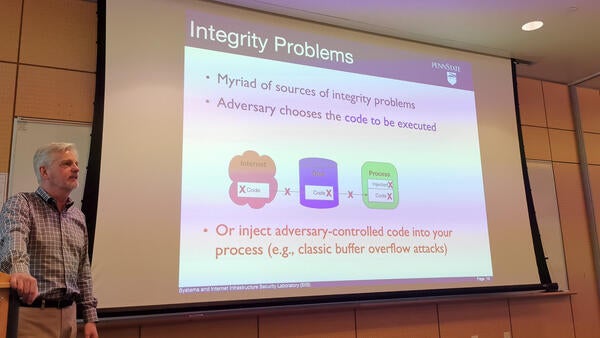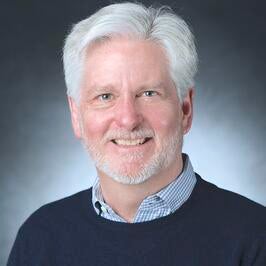
Trent Jaeger is the person you want on your team to keep you cyber-safe.
A longtime researcher collaborating with big tech and the U.S. government, the computer science and engineering professor explores automated methods to discover vulnerabilities in programs and to generate defenses to shield software from exploitation by criminals. Jaeger’s expertise in computer and network security helps society save millions of dollars, countless hours, and endless misery.
How many apps are on your phone? How safe are they? Would you know malware if you saw it?
Thanks to Jaeger, such questions need not preoccupy everyday digital consumers. He will join the Marlan and Rosemary Bourns College of Engineering’s (BCOE) Department of Computer Science and Engineering in January 2024 after nine years at IBM and 18 years at Penn State.
“I like the cat-and-mouse aspect of security,” Jaeger said, “thinking about what can go wrong and how to prevent it.”

By detecting vulnerable code and blocking its exploitation, he helps protect technology companies, the U.S. government, and digital device owners from e-crimes such as spying, data theft, and general mischief online.
Jaeger first began researching software security and its impact on society at the University of Michigan, when his Ph.D. adviser urged him to explore the then-emerging threat of malware in the recent functionality to permit the execution of email attachments. It was 1994, he said, just before the Internet took off and Nigerian princes began flooding inboxes.
Jaeger has hunted vulnerable code and ways to prevent its exploitation ever since:
- For decades, Jaeger has helped develop security breakthroughs for the widely used Linux operating system, which is a key component of modern networked systems such as e-commerce and cloud computing, including a mechanism to ensure that only approved code is run and another to limit which files programs can access.
- He has long assisted the U.S. government with defense and national security, preventing the same sorts of cyberbreaches he thwarts in commercial contexts. (“General mischief,” he said, “becomes a bit more of a concern when it’s in a military context.”)
- For years, Jaeger has partnered with companies such as Google, Microsoft, and Symantec; in fact, his team talks with Google every week or two. Much of this work centers on enhancing the safety of Android systems from possibly malicious apps downloaded from Google Play, as well as on protecting the Android and Linux operating systems.
When, for example, attackers exploited users’ microphone permissions to effectively surveil people without consent, “we built new defenses to make that really hard to do, yet not impact the usability of the devices,” he said.
These cases underscore a core challenge of cybersecurity: Many tools can be used for both good and ill.
A health monitoring app, for instance, “could save your life, but it could also send your health info to the wrong parties and you could get fired from your job,” Jaeger said. “It’s tricky.”
At BCOE, Jaeger will continue navigating that duality as he teaches classes, trains graduate students, and refines his research on securing computer software, networks, and operating systems.
He’s worked closely with UCR researchers over the past decade — and been impressed by the evolution of BCOE.
“It is an exciting time to join UCR,” Jaeger said, “as we now have a world-class team in computer security research.”
(Header photo credit: Kelby Hochreither)
In His Words

On his Career Highlights
“I was awarded an Outstanding Contributions Award by my research peers in 2020,” Jaeger said. “This award recognizes a combination of research, teaching, and service, so I am proud that my peers recognize my contributions across the spectrum.
“Second place would be the reception of my book Operating Systems Security. I have come to learn that people all over the world teach from the text — even to this day, as the book was published in 2008. I am pleased that the book is used in top science and technology universities (Carnegie Mellon, Eidgenössische Technische Hochschule [ETH] Zurich, and the Korea Advanced Institute of Science and Technology [KAIST] [South Korea], as well as local universities like Cal State Dominguez Hills.”
On Life Balance
“I like to run, bike (stationary), and hike. Our soon-to-be house is not far from several trails, so I look forward to that. I like movies and music, but I am unfortunately tone deaf. Not many people know that about me.”
The move to UCR also brings Jaeger, who grew up in the Los Angeles area, closer to his children.